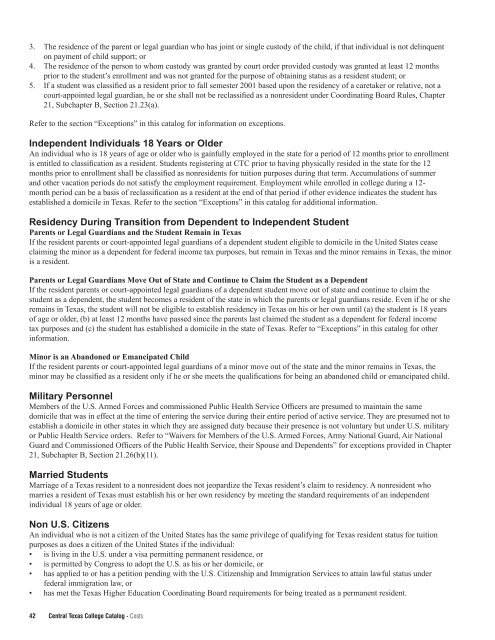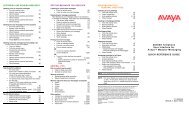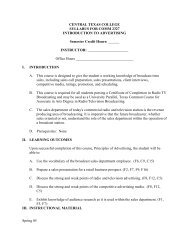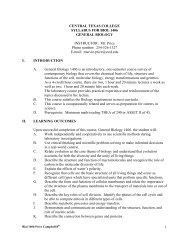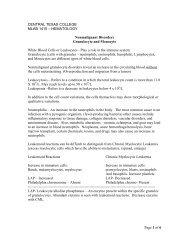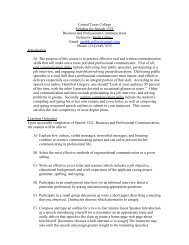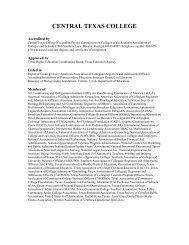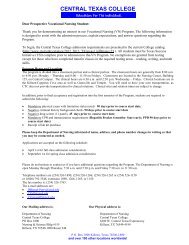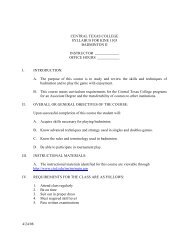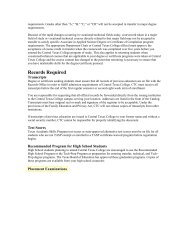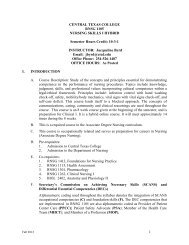Table Of Contents - Central Texas College
Table Of Contents - Central Texas College
Table Of Contents - Central Texas College
Create successful ePaper yourself
Turn your PDF publications into a flip-book with our unique Google optimized e-Paper software.
3. The residence of the parent or legal guardian who has joint or single custody of the child, if that individual is not delinquent<br />
on payment of child support; or<br />
4. The residence of the person to whom custody was granted by court order provided custody was granted at least 12 months<br />
prior to the student’s enrollment and was not granted for the purpose of obtaining status as a resident student; or<br />
5. If a student was classified as a resident prior to fall semester 2001 based upon the residency of a caretaker or relative, not a<br />
court-appointed legal guardian, he or she shall not be reclassified as a nonresident under Coordinating Board Rules, Chapter<br />
21, Subchapter B, Section 21.23(a).<br />
Refer to the section “Exceptions” in this catalog for information on exceptions.<br />
Independent Individuals 18 Years or Older<br />
An individual who is 18 years of age or older who is gainfully employed in the state for a period of 12 months prior to enrollment<br />
is entitled to classification as a resident. Students registering at CTC prior to having physically resided in the state for the 12<br />
months prior to enrollment shall be classified as nonresidents for tuition purposes during that term. Accumulations of summer<br />
and other vacation periods do not satisfy the employment requirement. Employment while enrolled in college during a 12month<br />
period can be a basis of reclassification as a resident at the end of that period if other evidence indicates the student has<br />
established a domicile in <strong>Texas</strong>. Refer to the section “Exceptions” in this catalog for additional information.<br />
Residency During Transition from Dependent to Independent Student<br />
Parents or Legal Guardians and the Student Remain in <strong>Texas</strong><br />
If the resident parents or court-appointed legal guardians of a dependent student eligible to domicile in the United States cease<br />
claiming the minor as a dependent for federal income tax purposes, but remain in <strong>Texas</strong> and the minor remains in <strong>Texas</strong>, the minor<br />
is a resident.<br />
Parents or Legal Guardians Move Out of State and Continue to Claim the Student as a Dependent<br />
If the resident parents or court-appointed legal guardians of a dependent student move out of state and continue to claim the<br />
student as a dependent, the student becomes a resident of the state in which the parents or legal guardians reside. Even if he or she<br />
remains in <strong>Texas</strong>, the student will not be eligible to establish residency in <strong>Texas</strong> on his or her own until (a) the student is 18 years<br />
of age or older, (b) at least 12 months have passed since the parents last claimed the student as a dependent for federal income<br />
tax purposes and (c) the student has established a domicile in the state of <strong>Texas</strong>. Refer to “Exceptions” in this catalog for other<br />
information.<br />
Minor is an Abandoned or Emancipated Child<br />
If the resident parents or court-appointed legal guardians of a minor move out of the state and the minor remains in <strong>Texas</strong>, the<br />
minor may be classified as a resident only if he or she meets the qualifications for being an abandoned child or emancipated child.<br />
Military Personnel<br />
Members of the U.S. Armed Forces and commissioned Public Health Service <strong>Of</strong>ficers are presumed to maintain the same<br />
domicile that was in effect at the time of entering the service during their entire period of active service. They are presumed not to<br />
establish a domicile in other states in which they are assigned duty because their presence is not voluntary but under U.S. military<br />
or Public Health Service orders. Refer to “Waivers for Members of the U.S. Armed Forces, Army National Guard, Air National<br />
Guard and Commissioned <strong>Of</strong>ficers of the Public Health Service, their Spouse and Dependents” for exceptions provided in Chapter<br />
21, Subchapter B, Section 21.26(b)(11).<br />
Married Students<br />
Marriage of a <strong>Texas</strong> resident to a nonresident does not jeopardize the <strong>Texas</strong> resident’s claim to residency. A nonresident who<br />
marries a resident of <strong>Texas</strong> must establish his or her own residency by meeting the standard requirements of an independent<br />
individual 18 years of age or older.<br />
Non U.S. Citizens<br />
An individual who is not a citizen of the United States has the same privilege of qualifying for <strong>Texas</strong> resident status for tuition<br />
purposes as does a citizen of the United States if the individual:<br />
• is living in the U.S. under a visa permitting permanent residence, or<br />
• is permitted by Congress to adopt the U.S. as his or her domicile, or<br />
• has applied to or has a petition pending with the U.S. Citizenship and Immigration Services to attain lawful status under<br />
federal immigration law, or<br />
• has met the <strong>Texas</strong> Higher Education Coordinating Board requirements for being treated as a permanent resident.<br />
<strong>Central</strong> <strong>Texas</strong> <strong>College</strong> Catalog - Costs


